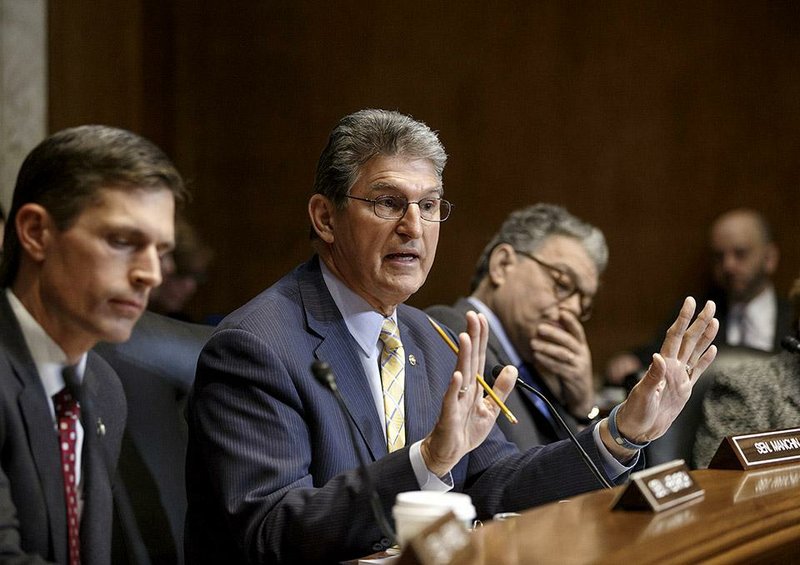WASHINGTON -- The Republican-led Congress ignored two veto threats and advanced bills Thursday that would curb President Barack Obama's health care overhaul and force construction on a proposed oil pipeline. The top House Democrat predicted that her party would uphold both of Obama's vetoes.
RELATED ARTICLES
http://www.arkansas…">State's 4 like 40-hour jobs for coveragehttp://www.arkansas…">Cotton to head subcommittee
On the new Congress' third day of work, a Senate committee approved a measure dismantling Obama's ability to block the Keystone XL oil pipeline, which has become a flash point pitting the GOP's jobs agenda against Democrats' environmental concerns.
The Senate planned to begin debate next week, and the measure seemed likely to pass. The House was poised to approve its version of the measure today.
Meanwhile, the House approved a bill Thursday narrowing the definition of full-time workers who must be offered employer-provided health insurance. The measure defines full time as 40 hours minimum per week instead of 30 hours.
The vote was 252-172, with the four representatives from Arkansas -- all Republicans -- voting in favor of the change.
On both bills, GOP leaders face uphill fights in getting the two-thirds House and Senate majorities needed to override vetoes. But both measures had some support from Democrats.
Republicans already have pointed to the bills as examples of bipartisan legislation that is being jeopardized by Obama and his Democratic allies.
"Given the chance to start with a burst of bipartisan productivity, the president turned his back on the American people's priorities," House Speaker John Boehner, R-Ohio, said Thursday. "We were taking our oath of office when they were issuing veto threats. Come on."
House Minority Leader Nancy Pelosi, D-Calif., said Democrats would sustain Obama's vetoes on both bills and that it was the Republicans who have blocked progress.
"The president has always extended the hand of friendship. Some say too much," she said.
She said Democrats also would uphold a promised Obama veto on a third measure, which seeks to roll back some regulations on the financial industry that were enacted after the 2008 economic crash. That bill fell short in the House this week but is expected to pass on a revote next week.
Obama's 2010 health care law, a perennial GOP target, is phasing in a requirement that companies with more than 50 full-time workers offer health care coverage or face having to make penalty payments to the government.
Backed by the U.S. Chamber of Commerce and other business groups, Republicans say defining full-time employees as those working at least 30 hours is pressuring firms to save money by cutting the hours of part-time workers who had been working more than 30 hours a week and by cutting the number of full-time jobs.
House Republicans say boosting the standard to 40 hours would protect those workers, and they named their bill the "Save American Workers Act."
They cite a study by the conservative Hoover Institution that says 2.6 million workers are at risk of having their hours reduced by the 30-hour minimum, including disproportionately high numbers of female, low-income, younger and less-educated workers.
"You say you care about low-income workers, about working women and small businesses?" House Majority Leader Kevin McCarthy, R-Calif., said in comments aimed at Obama. "Show it and sign this bill."
The White House and Democrats, with support from labor and liberal groups, mock the measure as the latest attempt by Republicans to scuttle Obama's health care law. The House has voted more than 50 times to repeal or roll back parts of that law since Republicans took control of the chamber in 2011.
Democrats say changing the full-time threshold from 30 to 40 hours would make fewer workers eligible for employer-provided health coverage and put more of them at risk of losing that coverage from companies looking to cut costs.
Rep. Sander Levin of Michigan, the top Democrat on the Ways and Means Committee, said Census data show that the vast majority of U.S. employees work 40 hours or more a week.
According to November 2014 figures from the federal Bureau of Labor Statistics, just under 10 percent of employees were working 30 to 34 hours weekly, while 41 percent were working 40 hours.
That's why there "is widespread concern" that many workers will see their hours cut if Republicans succeed in changing the health care law's definition of full-time work, Levin said.
Twelve Democrats joined all 240 voting Republicans in supporting the bill.
The measure's fate is less clear in the Senate, where Republicans would need at least six Democratic votes to get the 60 needed to overcome Democratic delaying tactics. Senate GOP leaders have not said when the bill will be debated.
Pipeline, immigration
Elsewhere on Thursday, lawmakers in the Senate Energy and Natural Resources Committee voted 13-9 to approve the Keystone XL oil pipeline.
Sen. Joe Manchin of West Virginia was the only Democrat who backed the measure, which would clear the way for a $5.4 billion project to carry oil produced in Canada to U.S. Gulf Coast refineries.
Republicans call the pipeline a job creator, while Democrats say it would worsen the threat of global warming.
Obama has said he will wait to make a final decision on the project until a Nebraska court case on the pipeline's route through that state is resolved and until the State Department has completed an environmental review of the proposal.
Obama's veto of the measure would not halt construction of the pipeline, but it would retain his authority to make a final decision on the plan, rather than ceding that authority to Congress.
"There's a veto threat, but I don't think that threat should deter us," said Sen. Lisa Murkowski, R-Alaska, the new chairman of the Senate energy panel.
"It's fair to say that the world is watching to see whether the United States is ready to lead as a global energy superpower, which I think we recognize we have become," she said. "I believe Congress is ready to send that signal in a bipartisan manner. I believe the American people are ready. It is unfortunate that the administration continues to stand in the way."
In another clash, Republicans planned a House vote next week to block spending for Obama's executive actions on immigration, which will shield as many as 5 million illegal aliens from deportation.
The vote will come as the House considers legislation to keep the Department of Homeland Security running past February. Lawmakers said the goal is to keep the agency running on full funding -- an especially critical goal in the wake of the Paris terror attacks -- but to stop Obama's immigration actions from taking effect.
"We are not going to allow taxpayer dollars to be used to fund those unlawful orders," said Rep. Martha Roby, R-Ala., who is among lawmakers who've been meeting with McCarthy to develop their response.
Yet it's unclear whether a House bill that would block funding for Obama's move will clear the Senate, where Republicans are six votes short of the 60-vote majority needed to advance most measures. The measure also is likely to face a veto threat from Obama.
Meanwhile, in one burst of bipartisan cooperation, Congress approved legislation Thursday to renew the federal program that shores up the private market for insurance against terrorist attacks.
The Senate approved the bill 93-4, a day after easy House passage of the legislation. Arkansas' Sens. John Boozman and Tom Cotton, both Republicans, voted in favor of the bill.
The program, which expired at the end of last year, provides a backstop in which the government steps in to cover the bulk of losses after the first $200 million in damage from a terrorist attack, up from $100 million previously. The government's share of losses above $200 million would be gradually lowered from 85 percent to 80 percent.
The program was enacted in 2002 after the market for terrorism insurance collapsed in the wake of the 2001 terrorist attacks.
Obama is expected to sign the bill into law despite having reservations about an unrelated provision that chips away at new regulations on financial instruments called derivatives.
Information for this article was contributed by Alan Fram, Dina Cappiello, David Espo, Stephen Ohlemacher, Andrew Taylor and Erica Werner of The Associated Press; by Coral Davenport of The New York Times; and by Billy House of Bloomberg News.
A Section on 01/09/2015

